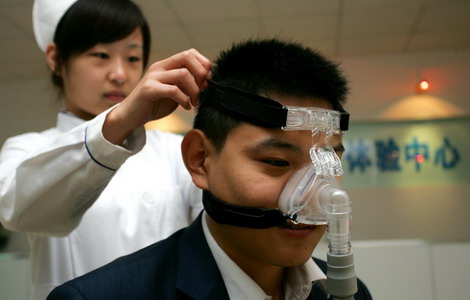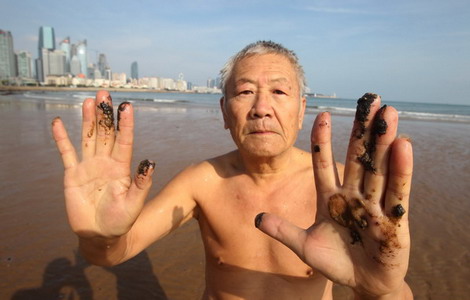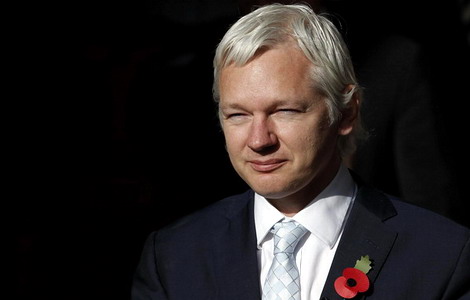Tokyo takes twin-track approach to Beijing
Updated: 2011-11-03 07:29
By Zheng Yangpeng (China Daily)
|
|||||||||||
Govt cooler on security, but still wants warm business ties
BEIJING - With the increasingly skeptical tone of some of its statements regarding China, Japan's new administration has opted for a twin-track approach in its dealings with Beijing, showing caution on security issues but wishing to be cooperative in the economic field, analysts said.
In a recent interview with Financial Times, Japanese Prime Minister Yoshihiko Noda called for closer co-operation among regional neighbors to persuade China's military to abide by "common maritime rules".
"(We will) appeal in all kinds of meetings for China to abide by the rules," Noda said. "The important thing is to create an environment where China will make a positive contribution to peace and stability in the Asia-Pacific region."
"The implicit message he sent is China doesn't conform to international rules," said Liu Jiangyong, a professor of Japanese studies at Tsinghua University.
But that is groundless as Noda didn't specify where and when China had failed to conform to international rules, said Liu.
For example, Japan criticized the activities of Chinese vessels and aircraft in the East China Sea, but part of that sea is disputed by China and Japan, said Liu.
"Noda doesn't appear to want to solve problems. His remarks just complicate matters," said Ma Gang, a professor at the National Defense University in Beijing.
In the interview, Noda also said he hoped there would be discussion of the issue at this month's East Asia Summit in Bali, Indonesia.
Noda's remark was one of several since he took office in early September, in which he bluntly expressed concern over the speed and "opaqueness" of China's military development, according to Yang Bojiang, a professor of Japanese studies at the Beijing-based University of International Relations.
What is more worrying is that Noda's rhetoric is accompanied by action. Japan's Self- Defense Forces are deploying forces from northern Hokkaido to the nation's southwestern islands to carry out a military exercise this month, Japanese broadcaster NHK reported.
This is in line with a medium- and long-term shift in Japan's defense strategy from the north to the southwest, which was outlined in the new National Defense Program Outline adopted last year.
Seeing China as a potential rival, according to Liu, contributed considerably to the strategic shift.
Japan has also weighed in on the South China Sea issue, citing "freedom of navigation" as the cause for its concern.
In a September joint statement, Noda and visiting Philippine President Benigno Aquino called for compliance with international norms in seeking a solution to disputes in the South China Sea.
Japan has no territorial dispute with China in the South China Sea. China has made clear that internationalizing the South China Sea issue would only make the issue more complicated.
"Japan's involvement in the South China Sea is in response to US claims of interest in the area," Yang said.
Tokyo and Beijing had a diplomatic spat in September 2010 in the East China Sea. Japan detained a Chinese fishing boat captain whose vessel had collided with Japanese coastguard ships in waters near China's Diaoyu Islands. The captain was later released, but not before relations had been damaged.
Despite taking a suspicious and critical stance toward China on the strategic and security front, Japan wants to cash in on rapid economic development in China, the second-largest economy in the world and Japan's largest trading partner, experts said.
In his interview with the Financial Times, Noda stressed Japan wanted a "win-win" strategic partnership with China.
However, the hotly debated Trans-Pacific Strategic Economic Partnership Agreement (TPP) may hamper China-Japan economic ties.
Japan's Yomiuri Shimbun, the nation's most widely circulated newspaper, said in an editorial that the TPP has the tacit purpose of countering China.
"Obviously there is a China consideration," said Yang. "TPP is the economic part of Washington's 'return to Asia' strategy. It risks undermining the current economic cooperation framework such as APEC and ASEAN plus 3 (China, South Korea and Japan) and reducing China's economic influence."
However, Japan does not embrace the TPP whole-heartedly as it faces strong opposition from domestic farmers because it threatens the price advantage they currently enjoy.
Mainichi Shimbun, another major newspaper in Japan, recently described Noda's foreign policy as "leaning toward a Japan-US alliance, countering China, and lacking diplomatic channels with China".
The description, according to Chinese experts, is generally true. "Noda's cabinet lacks China hands who can ease China-Japan relations," said Yang.
Japanese Foreign Minister Koichiro Genba will visit Beijing on Nov 22 and 23 in preparation for Noda's first visit to China, according to Kyodo News Agency. Noda has already visited to the US and South Korea since taking office.
Hot Topics
Libya conflict, Gaddafi, Oil spill, Palace Museum scandal, Inflation, Japan's new PM, Trapped miners, Mooncake tax, Weekly photos, Hurricane Irene
Editor's Picks

|

|

|

|

|

|







